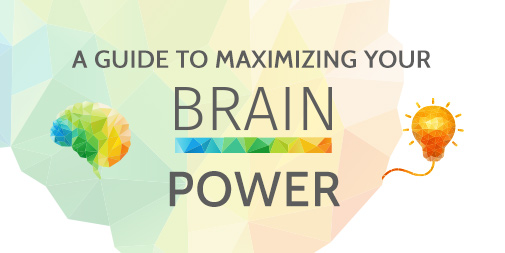Most have heard that as humans, we only use about 10% of our brain capacity. This myth, though cool sounding when voiced by Morgan Freeman in the film Lucy, is just that. A myth. Fact of the matter is, our brains are active 100% of the time. However, which areas of the brain do you use during that 100% of activity?
In the thriving amateur subculture – of “neuro-enhancement”, the prime objective is for folks to find ways to improve and use the maximum amount of brainpower available to us. Though we use our brain non-stop throughout our lives, is the correct portion of the brain power really being applied?
To ensure that you are using your brain to its full potential, there are a number of things you can do to improve performance, including but not limited to:
DOING SOMETHING NEW
 Doing something new will stimulate your brain and create neural pathways; thus giving your intelligence a ‘boost’. Intelligence refers to your method of thinking, and your capacity for logic understanding; not the amount of knowledge you are able to retain. Think about it (no pun intended), the more pathways you have in your brain, the more room there is for the application and storage of said knowledge. This can take on many forms above and beyond the standard ‘book learning’ and include activities such as travelling, learning to play a musical instrument, learning to speak a foreign language, or participating in social and community activities.
Doing something new will stimulate your brain and create neural pathways; thus giving your intelligence a ‘boost’. Intelligence refers to your method of thinking, and your capacity for logic understanding; not the amount of knowledge you are able to retain. Think about it (no pun intended), the more pathways you have in your brain, the more room there is for the application and storage of said knowledge. This can take on many forms above and beyond the standard ‘book learning’ and include activities such as travelling, learning to play a musical instrument, learning to speak a foreign language, or participating in social and community activities.
Instead of taking everything at face value, take the time to analyze, understand and learn how things work. By understanding the processes of how things work, you are allowing your brain to be more innovative and increasing your chances of creating something new! For example: first, there was the wheel, after which came the wheelbarrow, then the bicycle, then the car, and etc. Without learning how the first one worked, none of the others could follow.
The reality is, unless you’re doing something mildly unpleasant or perplexing, you probably aren’t using your brain much. An increase in brain use actually leads to a bit of discomfort. The same way physical exercise begins to physically hurt the muscles.
Unfortunately, this is the closest thing you’re going to get to concrete, science-backed proof when it comes to exercising your brain: don’t let things get too enjoyable. Once you’re pretty good at Sudoku, take a break from doing Sudoku. Start something new.
EXERCISE
 Exercise leads to not only the release of proteins, but also neurogenesis, meaning you are building more brain cells!
Exercise leads to not only the release of proteins, but also neurogenesis, meaning you are building more brain cells!
Mind you, having a large amount of brain cells is like having a powerful Jeep. If you only drive on smooth roads, you will never really utilize the potential of what it was made for. During exercise nerve cells release proteins known as neurotrophic factors. One in particular, called brain-derived neurotrophic factor (BDNF), triggers numerous other chemicals that promote neural health and directly benefits cognitive functions, including learning new things as mentioned previously.
BE OPTIMISTIC
Stress and anxiety have the power to kill neurons, as well as prevent new neurons from being created.
When stressed the body releases cortisol which begins to destroy newly built neurons in the hippocampus, the brain region involved in memory and emotion. While in small amounts stress is sometimes even so much as healthy (without cortisol we would die, but with too much it begins to take a toll too); in large doses or for prolonged periods of time, this leads to a cognitive decline and a worse memory, due to a number of brain cells being destroyed on a daily basis.
Moral of the story? Try to be optimistic and reduce your stress!
EAT HEALTHY
 Eating healthy is essential. Your brain uses about 20% of all the nutrients you consume daily, so it’s important to make sure you’re eating well.
Eating healthy is essential. Your brain uses about 20% of all the nutrients you consume daily, so it’s important to make sure you’re eating well.
Docosahexaenoic acid (DHA), an omega-3 fat, is an essential structural component of your brain. Approximately 60% of your brain is composed of fats—25% of which is DHA. The reason omega-3 fats such as DHA are considered vital is because your body cannot produce it, and must get it from your daily diet. DHA-rich foods include fish and liver. Obviously, none of these listed foods are a common ingredient in the kitchen, but that is why staying informed and making sure to include these in your diet is essential.
BRAIN GAMES
Neuroscience is still in its adolescence, however as young as it may be the theory of neuroplasticity has proven that brains are susceptible to change, regardless of age.
Your brain is a muscle. You need to exercise it regularly. The best part of it all, is that you don’t need to spend anything to improve your brain. All you need to do is invest a little time to regularly train it.
As with learning, stimulating your brain with mind-training workouts can keep your brain fit as you age. This can be something as simple as, doing crossword puzzles, thinking of every tree type you can name, or playing board games that get you thinking.
Utilizing your memory and taking the time to put effort into small things such as brain-games, phone numbers, street names and etc., will actually improve your ability to remember things for longer periods of time.
It’s important to remember to utilize your brain’s potential. While the brain may be active for 100% of the time, that doesn’t necessarily mean that we are always applying all of the power it has to offer. Training and providing for the brain is essential to ensure development and maximum power.
Disclaimer: Any views or opinions presented in this blog post are solely those of the author and do not necessarily represent those of Aversan Inc.
About the Author
![]()
Natalia Ross is an Administrative Assistant at Aversan, with a background in Animation and Graphic design. Outside of Aversan, she has been involved in various creative, as well as medicinal projects, including Orthomolecular Research and Development, in order to provide information about benefiting and maintaining the overall health of the human body. Although her main interests reside with history, film, and literature, she is can often found working on a variety of assignments in 3D, illustration and health.
Sources
Higbee, K.L. and Clay, S.L., College students’ beliefs in the ten-percent myth, Journal of Psychology, 132:469-476, 1998.
The Guardian: Can I increase my brain power?
http://www.theguardian.com/science/2014/jan/04/can-i-increase-my-brain-power
Lifehack: 10 Ways to Improve Your Memory & Boost Brainpower
http://www.lifehack.org/articles/lifestyle/10-ways-improve-your-memory-boost-brainpower.html

